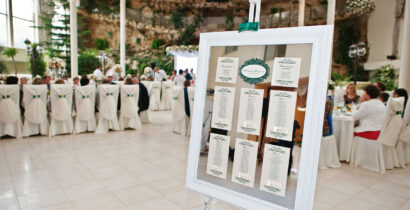How Much Should I Invest from My Wedding Budget in an Event Venue?
- varelacris10_cbcaiksp
- January 3, 2024
- Party Center
- 12 mins read
Choosing the event venue for your wedding is one of the most crucial decisions in planning your special day. The event venue you select will be the stage where your dreams come true and where lifelong memories are forged. Its significance goes beyond being a mere physical space, as it sets the tone and ambiance for the celebration. Therefore, determining how much you should invest in the event venue is a critical step in your wedding planning.
The relationship between the total wedding budget and the investment in the event venue is a delicate balance. The amount you allocate to this specific aspect of your wedding can significantly impact other elements like food, decoration, entertainment, and more. In this guide, we will explore how to make this decision wisely, considering your priorities and ensuring that your investment reflects the style and vision of your wedding.
Establishing a Wedding Budget for Your Venue
Determining how much you can spend on your wedding is one of the initial crucial steps in planning your big day. When it comes to hosting your wedding in an event venue, it is essential to establish a realistic budget that allows you to create the experience you desire without compromising your personal finances.
The location of the event venue is one of the most significant factors to consider when creating your budget. Rental fees vary widely based on geographic location, so researching different options in your area will provide you with a clearer idea of the costs. Additionally, consider the number of guests you plan to have. The more guests you invite, the higher the expenses for catering and the necessary space. On the other hand, personal expectations play a fundamental role. Do you want an intimate and straightforward wedding, or a luxurious and extravagant celebration?
As you set your budget, take into account other associated expenses, such as decorations, entertainment, food and beverages, photography, and more. Don’t forget to include a contingency fund for unforeseen expenses. Thoughtful and realistic planning will help you create a magical and meaningful wedding in your chosen event venue without straining your financial situation.
Prioritizing Investment in the Event Venue
When planning a wedding, one of the most crucial decisions is how much to invest in the event venue. This space will be the main stage of your celebration, and its choice will significantly impact the atmosphere and experience of your wedding. Here, we will explore why the event venue is one of the primary investments in a wedding and how comparing costs between luxury venues and more affordable locations can help you make informed decisions.
Why the Event Venue Is One of the Primary Investments in a Wedding
The event venue is not just a physical location but a key element in creating the ambiance and environment of your wedding. The choice of the venue affects the comfort of your guests, the logistics of the celebration, and the overall quality of the experience. Furthermore, the venue is a blank canvas that can be customized with decorations and details that reflect your style and vision.
Cost Comparison: Luxury Venues vs. More Affordable Locations
When it comes to prioritizing investment in the event venue, it’s important to compare costs between luxury venues and more affordable locations. Luxury venues often offer elegant facilities, high-quality services, and specialized staff to coordinate your wedding. However, this quality comes at a higher price. On the other hand, more affordable locations can be just as charming and welcoming but often require more work in terms of planning and decoration.
The choice depends on your priorities and your budget. If you value convenience and personalized attention, a luxury venue may be the right choice. If you prefer to save money and customize your wedding further, a more affordable location might be the best option. Ultimately, the key is to balance your desires and needs to create the wedding of your dreams within your budget.
Factors Influencing the Cost of the Event Venue
When determining how much to invest in the event venue for your wedding, it is essential to understand the factors that will influence the costs. Three of the primary factors are geographic location and season, the size and capacity of the venue, and the services and amenities offered by the location.
Geographic Location and Season
Geographic location plays a crucial role in determining the costs of the event venue. Popular and metropolitan areas tend to have higher rental rates than rural or less crowded areas. For example, a venue in the heart of a major city like New York or Los Angeles can easily cost double or triple the price of a similar venue in a rural or less congested area.
The season in which you plan your wedding will also affect costs. Peak season months, usually during the summer and on holidays, are often more expensive due to high demand. In contrast, off-peak season weddings may offer more affordable prices.
Size and Capacity of the Venue
The size and capacity of the venue are crucial factors in determining costs. A larger venue that can comfortably accommodate a greater number of guests generally has a higher rental fee. For example, a venue that can comfortably host 300 guests will have a higher rental cost than one that can only accommodate 100.
Services and Amenities Offered by the Venue
The services and amenities offered by the venue can also influence costs. Some event venues offer additional services such as catering, decoration, wedding planning, and support staff. These services can add an extra cost, but they can also simplify planning and reduce the need to hire external vendors.
For example, a luxury event venue in a premium location during peak season with full services like catering and decoration may have a rental cost of $10,000 or more, while a more modest venue in a rural location during the off-peak season may cost around $2,000.
Negotiation and Discounts for an Event Venue
Negotiation and seeking discounts are essential steps when planning your wedding at an event venue. Often, venue providers are willing to be flexible in terms of pricing and services to earn your business. Here, we will explore strategies for negotiating prices and obtaining discounts, as well as key considerations about contracts and important clauses.
Strategies for Negotiating Prices and Obtaining Discounts
- Pre-research: Before starting negotiations, research other event venues in the same area. This information will provide you with a solid basis for negotiation, as you can compare prices and services offered by different venues.
- Inquire about customized packages: Many venues offer customized packages that include various services such as catering, decoration, and wedding planning. Ask if they can customize a package that fits your specific needs. Often, this can be more cost-effective than paying for services separately.
- Negotiate dates and times: If you have flexibility regarding the date and time of your wedding, you can negotiate lower rates for less sought-after days and hours. Friday evenings or Sunday mornings, for example, are often more affordable than Saturday nights.
- Request volume discounts: If you are planning a wedding with a large number of guests, inquire if the event venue offers volume discounts. Some places may reduce per-person fees as the number of guests increases.
Considerations about Contracts and Important Clauses
- Read the contract carefully: Before signing any contract with the event venue, make sure to read it thoroughly and understand all the clauses. Pay special attention to details regarding fees, dates, times, cancellation policies, and any restrictions related to decoration or catering.
- Cancellation and refund clauses: Ensure that you understand the cancellation and refund clauses in case you need to change or cancel your wedding. Inquire about refund policies and whether it is possible to transfer your deposit to an alternative date.
- Details about additional services: If the contract includes additional services such as catering or decoration, ensure that all details are clearly specified. This includes the menu, decoration options, service fees, and any additional costs.
- Payment deadlines: Verify payment deadlines and make sure you understand when and how payments should be made. This will help you avoid financial surprises along the way.
- Consider legal assistance: If you have doubts or concerns about the contract, consider seeking legal advice before signing it. A contract attorney can help you better understand your rights and responsibilities.
Alternatives to the Traditional Event Venue
When it comes to planning a wedding, not all couples opt for a traditional event venue. There are various alternatives that offer unique experiences and can have a significant impact on the wedding budget. Some of the most popular options include outdoor weddings, backyard weddings, and destination weddings. Below, we will explore these alternatives and discuss the pros and cons in terms of the budget.
Outdoor Weddings
An outdoor wedding can be a charming and budget-friendly choice for those who desire a ceremony surrounded by natural beauty. Parks, gardens, beaches, and fields are popular options. The pros include the potential for savings on decorations since nature becomes the backdrop, and a relaxed and picturesque atmosphere. However, it’s important to consider that permits may be required, and the weather can be unpredictable, which could necessitate additional expenses for a tent or a contingency plan.
Backyard Weddings
Hosting your wedding at home can offer an intimate and personal atmosphere. The pros include total control over the environment and the potential to save on venue rental. However, it’s crucial to consider additional costs for preparing your home, such as renting portable toilets and preparing the space. Additionally, it’s important that your property has the necessary space and amenities to accommodate your guests.
Destination Weddings
A destination wedding in a distant location can be an unforgettable experience but can also be costly for guests who must travel. The pros include the opportunity to combine the wedding with the honeymoon and the possibility of an intimate wedding with a select group. The cons include travel expenses for both the couple and the guests, as well as additional logistical coordination.
Tips for Maximizing Your Investment in the Event Venue
The choice of an event venue is one of the most significant investments in wedding planning, and it’s essential to maximize its value within your budget. Here, we offer some tips to make the most of your investment in the event venue without compromising on quality or personalization.
Ideas for Personalizing and Decorating the Venue Without Overspending
- DIY Centerpieces: Instead of purchasing expensive floral arrangements, consider creating customized centerpieces. You can use elements like candles, LED lights, or thematic items that reflect your style and your partner’s.
- Reusable Decor: Opt for decor that you can reuse or resell after the wedding. This includes garlands, hanging lights, and other decorative items that can serve a second purpose or be sold to other couples.
- Utilize Natural Beauty: If the event venue has an attractive natural setting, such as gardens or fountains, make the most of this feature and minimize the need for additional decoration.
- Craftsmanship and Personal Touches: Add personal touches with handmade elements or meaningful details for you and your partner. This can include creating personalized signs, handmade table details, or unique keepsakes.
How to Save on Food and Beverage Without Sacrificing Quality
- Opt for Simpler Menu Options: Instead of an extravagant menu, consider simpler yet delicious dishes. The quality of ingredients and presentation can be impressive without the need for expensive dishes.
- Limited Bar Selection: Instead of a fully open bar, offer a limited selection of drinks, such as wine and beer, with the option of special drinks during a specified period.
- Extended Cocktail Hour: Extend the cocktail hour so that guests can enjoy appetizers and drinks for a more extended period before dinner, reducing the need for a lavish meal.
- Negotiate with the Caterer: Take advantage of negotiations with the catering provider to secure discounts or customized packages that fit your budget.
By applying these tips, you can optimize your investment in the event venue and achieve a memorable wedding without compromising on quality or personalization.
The Importance of Planning and Time Management for Your Wedding Venue
Planning and time management are essential components in preparing for a successful wedding. By anticipating and organizing every aspect of your wedding well in advance, you can gain significant advantages in terms of cost savings and avoid last-minute additional expenses.
How Planning Ahead Can Save You Money
When you start planning your wedding well in advance, you have the opportunity to research and compare vendors and services. You can obtain multiple quotes and negotiate more favorable prices, as vendors often offer better deals to clients who book in advance. Additionally, you have time to take advantage of special offers and promotions that may arise along the way. Planning ahead also allows you to establish a realistic budget and stick to it. You can evenly distribute your expenses over time, preventing overwhelming financial burdens at the last moment.
Avoiding Last-Minute Additional Costs
One of the biggest mistakes couples make is leaving the planning of certain details to the last minute. Last-minute additional costs can quickly add up, as vendors may charge higher fees for urgent services or last-minute changes. Furthermore, a lack of time can lead to rushed decisions and unnecessary expenses. For example, by booking your reception venue in advance, you can avoid the surprise of finding that popular venues are fully booked and being forced to choose a more expensive or less desired option.
Examples of Real Budgets
Case Study 1: Traditional Couple in Luxury Venue
One couple opted for a luxury venue that cost $15,000. 60% of their budget, which is $18,000, was allocated to the venue and food, $6,000 (20%) went towards photography and attire, and the remaining 20%, $6,000, was distributed to other services. The luxury of the venue complemented their traditional style, but the high cost limited other areas.
Case Study 2: Intimate Wedding in an Economical Venue
Another couple chose a more economical venue that cost $5,000. 40% of the budget, $8,000, was allocated to the venue and food, 30% ($6,000) to photography, 15% ($3,000) to decor, and 15% ($3,000) to additional services. They opted for a simple yet charming approach that allowed them to save and prioritize the experience.
Case Study 3: Exotic Beach Destination
An adventurous couple decided to get married in an exotic destination, which included travel and accommodation for a total cost of $10,000. 50% of the budget, $15,000, was allocated to the destination celebration, and 25% ($7,500) to essential services like food and photography. They chose a unique experience, sacrificing luxurious elements but creating unforgettable memories.
In summary, investing wisely in the wedding venue requires careful planning and consideration of the couple’s personal priorities. Key points include determining a realistic budget, prioritizing venue investment according to individual preferences and needs, and exploring alternatives if necessary.
Additionally, smart negotiation and time management can help you get the best value for every dollar spent. Ultimately, the investment in the wedding venue should reflect the couple’s vision and desire, ensuring that their special day is truly unforgettable and meaningful.





